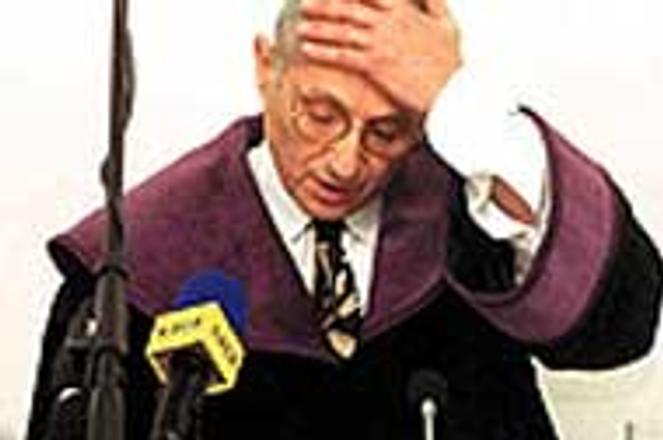Justice Tibor Šafárik ruled on December 20 that a former Slovak secret service officer had had his Constitutional rights violated.photo: TASR
A verdict handed down by the Constitutional Court on December 20, exactly one month before the Court's judges end their seven-year terms on the bench, has been dismissed by legal experts as owing more to politics than justice.
The Court ruled that the constitutional rights of Jaroslav Svěchota, a former Slovak secret service (SIS) officer, had been violated by the Interior Ministry during his prosecution for involvement in the 1995 kidnapping of the former president's son, Michal Kováč Jr.
Led by Justice Tibor Šafárik, the Court said that an amnesty issued in March, 1998 by former Prime Minister Vladimír Mečiar to those involved in the Kováč kidnapping, and then amended by Mečiar in July, should have prevented Svěchota's prosecution. Svěchota was taken into pre-trial custody in February, 1999 on suspicion of having participated in the Kováč abduction.
Legal observers said they were surprised by the December 20 verdict because the Court had already turned down Svěchota's first petition, and had rejected almost 20 other complaints filed by those under investigation in the same kidnapping case.
But Justice Šafárik went on to call a press conference on December 22, at which he expressed his opinion that all the accused in the abduction case, including former SIS boss Ivan Lexa, should be released.
The strongest reaction to the ruling came from a group of respected lawers, including former Czechoslovak Constitutional Court Chief Justice Ernest Valko, constitutional law expert Peter Kresák and Justice Ministry Office Director Daniel Lipšic. In a document entitled "Enumeration of Incorrect Standpoints and Legal Conclusions," the three lawyers singled out seven aspects of the Šafárik ruling for criticism, among them the initial decision to accept Svěchota's petition and the impact the decision was likely to have on the prosecution of Lexa.
According to the document, Court decisions apply only for future and not for past cases, meaning that Šafárik should not have ruled on what had happened to Svěchota before it handed down its verdict. The December 20 ruling, the authors wrote, "clearly testifies to the tendentious approach taken by the First Senate of the Constitutional Court [a group of four judges led by Šafárik which wrote the decision - ed note], which has repeatedly breached not only the previous decisions of the Court, but also the text of the Slovak Constitution."
Šafárik, for his part, told the opposition daily Slovenská Republika on December 27 that his critics were one-sided, and "don't understand" their own arguments. "The truth is that I'm a constitutional functionary, and Mr. Lipšic is only a clerk," he said.
Prosecution continues
Šafárik's decision in effect overturned the February decision of the Interior Ministry to charge Svěchota with abduction, robbery and abuse of power. According to Ján Drgonec, a Constitutional Court judge who sits on the Court's Second Senate, it was the first time in Slovak history that the Court had overturned the decision of another state authority.
Drgonec said in an interview for the Sme daily paper on December 20 that Šafárik's decision to accept Svěchota's complaint violated the principle of 'legal certainty', which says that similar cases should be treated in a similar way by the courts. "The decision of the first senate is totally contradictory to about 30 previous Court decisions," he said. "I don't have the slightest doubt it was politically motivated."
Undeterred, the Interior Ministry has vowed to continue in its prosecution of Svěchota. The Ministry's Chief Investigator, Jaroslav Ivor, told The Slovak Spectator on January 4 that Svěchota's prosecution on the abduction charges had ceased, but was continuing on other offences. "These include abuse of power as a civil servant, fraud, robbery and other financial crimes," he said, adding that the prosecutions of other suspects in the abduction case are continuing.
Other members of the government are also looking for ways to circumvent the Šafárik verdict. Lipšic revealed on Jaunary 3 that his boss, Justice Minister Ján Čarnogurský, had finished a draft amendment to the constitution which would forbid amnesties to be given in abductions and related crimes, and make prosecution of such crimes mandatory.
"The draft is based on a document from the United Nations' General Assembly from 1992, which declared protection for people from forced disappearance and excluded amnesty for kidnappers," Lipšic said, adding that the draft also proposed to strip the president of the power to halt or prevent criminal prosecutions. The Slovak cabinet will discuss the proposal on January 12, while its sponsors hope their bill will be passed in accelerated legislative proceedings in parliament.
Legal expert Kresák, who is also an independent MP, said on January 4 that he would support such changes. "This kind of situation simply must be prevented in the future," he said. "It's the duty of the parliament to protect citizens and secure constitutionality in the country."
But Eduard Barány, director of the Institute of State and Law at the Slovak Academy of Sciences and one of the new judges appointed to the Constitutional Court, said he did not think even a constitutional amendment could overturn the Šafárik decision, and that he opposed chaging the country's most important legal document to settle a single case.
"This would be a law created not based on a general need, but for this specific case. I think such a solution could be called non-traditional," he said.


